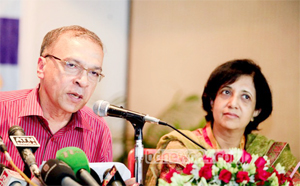Education in the country’s private universities has turned into a commercial venture and various kinds of financial malpractice are taking place, Transparency International Bangladesh (TIB) disclosed on Monday.
According to the findings of the civil society organisation, money is changing hands illegally for obtaining fake certificates, for approving the setting up of universities, for approving recruitment of vice-chancellors (VC), pro-VCs and treasurers, and for other murky dealings. Fake certificates are available for Tk. 50,000 to Tk. 1 lakh, approval for setting up universities for Tk. 1 crore to Tk. 3 crore, approval for recruitment of VCs, pro-VCs and treasurers for Tk. 50,000 to Tk. 2 lakh, approval for faculty members for Tk. 10,000 to Tk. 30,000, approval for departments for Tk. 10,000 to Tk. 20,000, audit in lieu of money for Tk. 50,000 to Tk. 1 lakh, and assignments for Tk. 500, while for granting pass marks and increasing numbers, gifts or hard cash have to be given, according to the findings. TIB presented the findings at a press conference on ‘Private Universities: Challenges of Good Governance and Way Out’, at the BRAC Inn Centre in the capital. TIB collected information from 22 private universities in Dhaka, Chittagong and Sylhet through random sampling between June 2012 and May 2014.
The report also found that a university had taken Tk. 3 lakh per head from around 300 students to provide certificates though they had not attended classes, appeared in the exams or attended practical classes.
Deputy manager Nina Shamsur Nahar and director Mohammad Rafique Hasan of TIB’s research and policy department read out the findings. The organisation’s executive director Dr Iftekharuzzaman and deputy executive director Dr Sumaiya Khayer were present on the occasion.
“A section of the education ministry, a section of the University Grants Commission (UGC) and a section of the universities are involved in such illegal transactions,” Dr Iftekharuzzaman stated.
“Many businessmen are entrepreneurs of private universities at present. They consider this sector to be a source of profits even though this sector should have been a non-profit one. As a result, higher education has become a commercial commodity,” he further asserted.
As far as the entrepreneurs involved with the private universities are concerned, TIB’s report said 29.6 per cent were businessmen, 22.5 per cent educationists, 8.5 per cent politicians, seven per cent physicians, 5.6 per cent retired government officers, another 5.6 per cent social workers and 4.2 per cent are NGO entrepreneurs.
The report also found that between 1992 and 2013, a total of 79 private universities has been approved. During the tenure of the Bangladesh Nationalist Party-led government, a total of 16 universities was approved in 2003, while during the Awami League-led government’s tenure, in 2012, a total of 16 universities was approved. In 2013, 11 universities were approved.
However, no private university was approved in 1994, between 1997 and 1999, and between 2007 and 2011, it noted. The TIB also detected various kinds of irregularities and corruption in the private universities, including the illegal use of outer campuses. Outer campuses were kept open, ostensibly as ‘admission and counselling centres’, although the government had announced some campuses would be shut down.
Among other instances of corruption, the report mentioned that university funds were used by trustees for personal use without informing the University Grants Commission (UGC); bank loans were taken and funds embezzled by using false documents and signatures in the name of the university; a fake receipt of Tk. 3 crore was issued from the reserve fund to the UGC; influence was exercised along with nepotism, and monetary transactions made, in the recruitment process of VCs, pro-VCs, treasurers and teachers; and functionaries were working in more than two universities despite a prohibition by the UGC, which allows functionaries to work in only two.
Regarding the irregularities, the report found that the most of the private universities were being run by temporary or acting VCs, pro-VCs and treasurers. It noted that 79 private universities have 52 VCs, 18 pro-VCs and 30 treasurers.
The TIB placed a 16-point set of recommendations, including shutting down all the outer campuses of private universities, taking steps to stop the business in issuance of certificates, making necessary amendments to the Private University Act, 2010 and formulating a complete set of regulations, forming an accreditation council, enhancing the education ministry’s manpower and capacity, and enhancing the UGC’s manpower and financial capacity.
Expressing concern over the irregularities and corruption, Dr Iftekharuzzaman said, “Massive irregularities and corruption are occurring in the private universities since transparency, accountability, coordination and an effective system of regulations are absent.”
Meanwhile, renowned academics heavily came down on the TIB for its report saying the anti-graft watchdog always tries to create sensation by publishing such report.
When contacted, Education Minister Nurul Islam Nahid, University Grant Commission Chairman prof. Dr AK Azad Chowdhury, and North South University Pro-vice-chancellor ANM Meshquat Uddin termed the report baseless.
Nurul Islam Nahid termed the TIB’s report “baseless and fabricated” and said the organization should refrain from publishing such reports.
Source: Weekly Holiday










